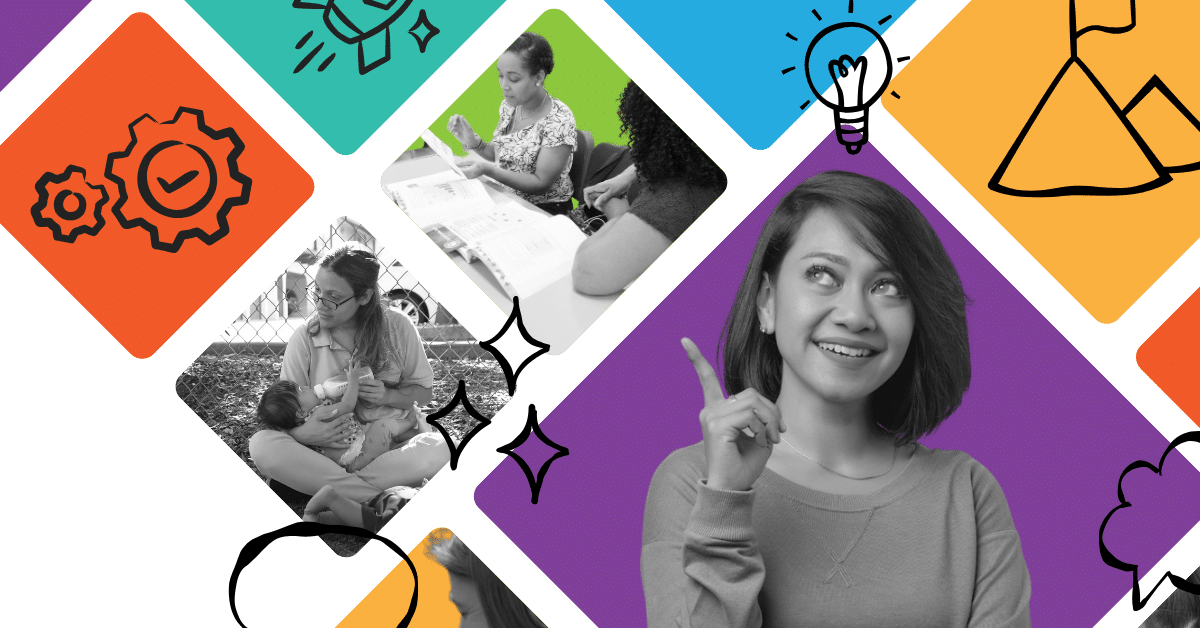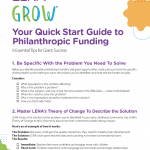What keeps an early childhood educator going when the days are long, the pay is low, and society doesn’t always recognize their work? Ask any teacher. It’s the excitement of small moments. A toddler’s first full sentence, a shy child speaking up at circle time, a preschooler writing their name. Little lightbulb moments when a child just “gets it” and the teacher knows they had something to do with that.
But how do we support these dedicated professionals in ways that actually make a difference? During LENA’s recent webinar, “The Right Way to Invest in Early Childhood Educators,” expert panelists tackled this question. They explored how we can move beyond simply rating teacher performance to truly investing in educator success. They talk about the best ways to improve early childhood teacher retention rates.
Our panel brought together voices from across the early childhood field. Katorra Enoch Longshore shared insights from her work with the Council for Professional Recognition. Rhodus Riggins Jr. offered his perspective from UNC-Greensboro’s quality improvement projects and North Carolina’s Infant and Early Childhood Mental Health Association. Mahdyeh Phillips brought her hands-on coaching experience to the conversation. And Mildred Evans provided the invaluable viewpoint of a family child care provider who’s been in the trenches for years.
Together, they painted a picture of what’s possible when professional development becomes about recognition, growth, and genuine support rather than just checking boxes.
How Early Childhood Professional Development Can Reignite Passion
Many professional development programs feel like something that happens to teachers, not with them. Sit through another workshop, check off another requirement, move on. What if we changed that up entirely?
“Professional development provides recognition value,” says Katorra Enoch Longshore during the webinar. “It helps support confidence in their work, and to me, it’s very crucial for early childhood teacher retention and job satisfaction.”
Rhodus Riggins Jr. agreed. Good professional development should build on the “rich reservoir of knowledge and experience that adults bring into the space.” Too many training programs treat educators like they don’t know anything. Effective programs help teachers see what they already do well.
Rhodus calls this “priming the learning pump.” He wants professional development that goes beyond helping teachers get better at their current jobs. When early childhood teachers see a real path forward, they stay in the profession longer and bring more energy to their work.
Teachers who feel valued create better learning environments. They take more risks and invest more deeply in relationships with children and families. They also approach new information differently.
When professional development honors who educators are as people, they become more open to feedback and data that can help them grow.
Data That Honors the Person Behind the Teacher
Speaking of data. It can feel cold and judgmental. Numbers on a screen don’t capture why someone chose early childhood education. They don’t show what keeps teachers coming back each day. But what if data could actually help early educators reconnect with their purpose?
Mahdyeh Phillips has figured out how to make this work. As a quality improvement coach, she starts every relationship with a simple question: “Tell me why you’re here. You could be anywhere in the world right now, and why are you choosing to be here?” She uses something called the “seven layers deep” technique, asking why seven times to uncover real passion and purpose.
This approach transforms how feedback works entirely. Instead of using LENA’s conversational turns data to evaluate teachers, coaches can use it to help educators see their strengths, and to remind them of their “why.” When Mahdyeh reviews data with teachers, she asks what went well first. This lets teachers focus on their successes, which builds the foundation for growth.
Another powerful layer to the approach to data has to do with culture. When coaches and leaders understand where teachers come from and what they bring to their work, the data becomes meaningful instead of threatening. Without this understanding, Mahdyeh says, “you’re going to ignore that individual altogether — and how can they grow if they’re not even feeling seen or heard?”
This creates what Rhodus calls “reciprocity” in relationships between leadership and early educators. If program directors and mentors want teachers to be sensitive and responsive with children, they need to model those same qualities. Then, teachers feel supported instead of judged. And data becomes a mirror for reflection rather than a scorecard for evaluation.
This human-centered approach works, but it requires more than good intentions. It demands systemic changes that recognize the true value of early childhood educators.
Early Childhood Teacher Retention: How Investment in Education Supports Better Compensation
Rhodus puts it bluntly: “The early care and education field is a marginalized field.” This field consists primarily of women of color who have less access to higher education and professional development compared to other caregiving professions. Both historical and contemporary barriers keep talented early educators and caregivers from advancing.
Quality early childhood professional development and education access create a powerful cycle that can break these patterns. When organizations invest in education for early childhood educators, they’re building cases for better compensation.
Katorra sees this connection clearly through her work with professional recognition. She talks about “apprenticeship models” and pathways that lead to “higher recognition, title, professionalization and compensation.” The council is actively working to assign recognition levels to different types of training, creating clear blueprints for career advancement.
Better training leads to higher qualifications, which leads to better compensation, which improves early childhood teacher retention. Organizations that understand this cycle are already seeing results. Teachers with strong professional development support stay longer, feel more confident, and create better learning environments.
This strategy addresses both individual growth and systemic change simultaneously. And it works. But creating these supportive environments requires leaders who understand how to build cultures where educators actually want to stay and grow.
The Future of Teacher Retention: Amplifying Voices
Change happens when people share their stories. The panelists agree that early childhood educators need to become their own advocates, but not in the way you might think.
“Just show up, tell your truth, and watch it go where it needs to go,” says Katorra Enoch Longshore. She believes advocacy doesn’t require special training or political expertise. It starts with owning your voice and understanding that your story matters.
What gives Mahdyeh Phillips hope? Knowing that others are asking questions too. “I’m not the only one asking questions,” she explains. “When I go and sit down with teachers or with directors of people in the field, they’re asking questions.” They want to see change. They want to know why things work the way they do and feel empowered to speak up.
Rhodus Riggins Jr. captures the long-term vision well: “The fall of dropping water wears away the stone.” Individual efforts might seem small, but they create lasting change over time.
The path forward is about providing immediate support and long term change. Early childhood teacher retention happens when professional development honors educators as whole people. It happens when data becomes a tool for growth instead of judgment. And it happens when training creates real pathways to better compensation. Teachers thrive. Children benefit more, and the entire field starts to shift.
LENA’s approach to measuring conversational turns embodies many of these principles. Instead of evaluating teachers, the data helps educators see their impact and set meaningful goals. It’s professional development that recognizes expertise while building on what teachers already do well.
The conversations happening in early childhood classrooms today shape tomorrow’s leaders, innovators, and problem-solvers. Supporting the educators who facilitate those conversations is essential for our future.
Ready to see how these principles work in practice? Want to watch the full replay of this webinar? Stream it here!



